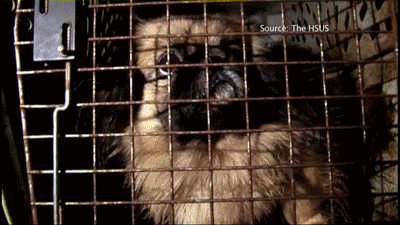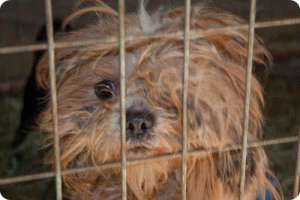|
|



|
About Puppy Mills
Did you know that some of these beautiful dogs you have been viewing started their lives in a puppy mill or with a backyard breeder?
These are the lucky ones because they are on their way to a loving family, but there are so many others out there, begging for help. You can help stop the vicious cycle that so many of these poor dogs are in - DO NOT purchase a dog from a pet store. Make sure you check out the breeder you are purchasing your pet from, meet the parent of your pup, and make sure you ask questions of their overall health. Don't hesitate to ask if they have been genetically tested to prevent future health problems, such as luxating patellas, stenotic nares, etc.
Fact: Over five hundred thousand puppies are born in puppy mills every single year.
Fact: Female dogs are bred when they are just six months old and twice a year thereafter until their bodies wear out and they die at about four or five years old.
Fact: The puppies born in mills often have diseases, genetic defects, and emotional problems.
Fact: Many kennels do not have climate control. The dogs freeze in winter and swelter in summer, often dying from exposure. Puppies are known to have "cooked on the wires."
Fact: Female dogs are bred so many time their internal organs grow together.
Fact: Dogs suffer malnutrition so severe that their hair falls out.
Fact: A combination of poor food, poor conditions and no veterinary care causes their teeth to rot at early ages. Often the dogs have such gum disease their jaws rot.
Fact: Dogs often get their feet and legs caught in the wires of the cages and in the struggle to free themselves their feet or legs are ripped off.
Fact: Dogs in mills are debarked by shoving a metal pipe down their throats to rupture their vocal cords.
Fact: When dogs are used up, they are often shot, hit in the head with a rock or dumped.
The conditions in the mills are unrelentingly brutal and terrifying. Many dogs eventually lose their minds from fear. Their eyes glaze over and they withdraw. Frequently they develop repetitive behaviors like licking, biting their fur, and spinning round and round in circles.
The dogs never get out of the wire cages. They never touch the ground. They never run in the grass. Dogs are often trapped in cages with aggressive dogs and have no way to escape. Their bodies are often covered with open wounds, broken limbs, or worse.
These dogs have committed no crime. They are no different than your beloved pets.
They long to be free, safe, warm, and loved. Instead they are in miserable prisons suffering horrors inflicted by humans - all for greed.
Please help stop this massive, hideous form of breeding and selling of dogs. How?
- Adopt your pet from a quality, humane breeder, a shelter or a humane society.
- Put up a billboard in your area about puppy mills.
- Tell everyone you know about puppy mills.
- Write a letter to the editor of your local paper.
- Call in to a talk show.
- Write your state and federal representatives and ask them to pass stronger laws to protect dogs.
- Write your local officials and ask for stronger zoning ordinances to stop puppy mill operations.

Bred for profit. Caged for life.
When it comes to our furry family members, it's the oldest adage there is: "A dog is man's best friend."
But it might turn your stomach when you see the wretched places where some of our so-called best friends are born.
We doubt you'd subject your own dog to the conditions of some of these large scale breeders, known as puppy mills.
But if your family dog came from a pet store, there's a good chance it was born in one of those mills, to a mother who is still there, being bred for profit, and caged for life.
Watch Video
|

Behind the Scenes - A Closer Look at the Puppy Mill Industry
"The stench of garbage, urine and feces is unbearable. Ammonia hangs heavy in the air and flies are everywhere.
Dim lighting and the constant barking of dogs in distress create a sense of chaos.
Row upon row of stacked cages hold dogs matted with feces - some too sick to move. This is the world of a puppy mill dog."
It's important to know that, in many cases, puppy mills are not illegal. In most states, a breeding kennel can legally keep dozens, even hundreds, of dogs in cages for their entire lives, as long as the dogs are given the basics of food, water, and shelter.
Because most puppy mills are not illegal, we need help from the public to put an end to the consumer demand for their "product." You can help end the suffering and put a stop to puppy mills by getting your next dog from an animal shelter, rescue group, or a humane and responsible breeder that you have carefully screened in person. But most importantly, be informed and pass your knowledge onto others. What is a Puppy Mill?
|
|
|


All it takes for evil to prevail is for good people to do nothing.
|









